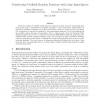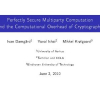155
click to vote
EUROCRYPT
2010
Springer
15 years 2 months ago
2010
Springer
We investigate the possibility to prove security of the well-known blind signature schemes by Chaum, and by Pointcheval and Stern in the standard model, i.e., without random oracle...
124
click to vote
EUROCRYPT
2010
Springer
15 years 5 months ago
2010
Springer
We present a family of verifiable random functions which are provably secure for exponentially-large input spaces under a non-interactive complexity assumption. Prior construction...
130
click to vote
EUROCRYPT
2010
Springer
15 years 5 months ago
2010
Springer
We construct an efficient identity based encryption system based on the standard learning with errors (LWE) problem. Our security proof holds in the standard model. The key step in...
108
Voted
EUROCRYPT
2010
Springer
15 years 5 months ago
2010
Springer
At CRYPTO 2008 Stam [7] made the following conjecture: if an m + s-bit to s-bit compression function F makes r calls to a primitive f of n-bit input, then a collision for F can be ...
120
click to vote
EUROCRYPT
2010
Springer
15 years 7 months ago
2010
Springer
A seminal result of Cleve (STOC ’86) is that, in general, complete fairness is impossible to achieve in two-party computation. In light of this, various techniques for obtaining...
EUROCRYPT
2010
Springer
15 years 7 months ago
2010
Springer
168
click to vote
EUROCRYPT
2010
Springer
15 years 7 months ago
2010
Springer
Imagine many small devices send data to a single receiver, encrypted using the receiver’s public key. Assume an adversary that has the power to adaptively corrupt a subset of the...
159
click to vote
EUROCRYPT
2010
Springer
15 years 7 months ago
2010
Springer
This paper revisits the construction of Universal One-Way Hash Functions (UOWHFs) from any one-way function due to Rompel (STOC 1990). We give a simpler construction of UOWHFs, whi...
122
click to vote
EUROCRYPT
2010
Springer
15 years 7 months ago
2010
Springer
We describe a very simple “somewhat homomorphic” encryption scheme using only elementary modular arithmetic, and use Gentry’s techniques to convert it into a fully homomorph...




